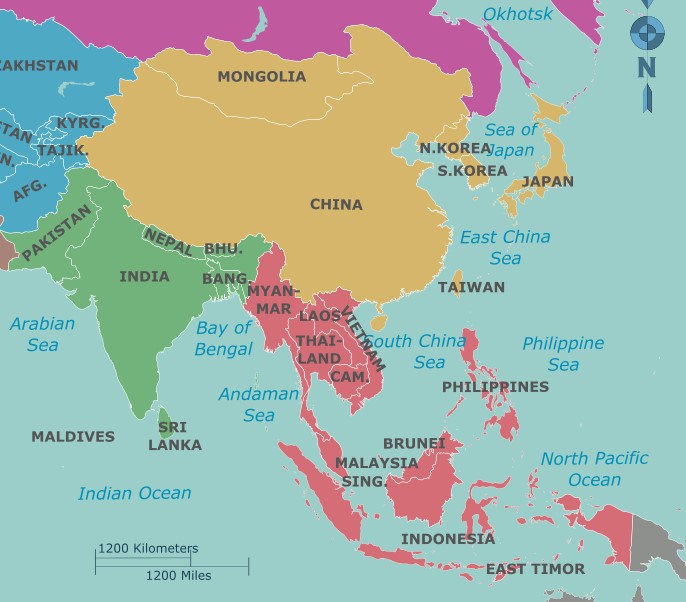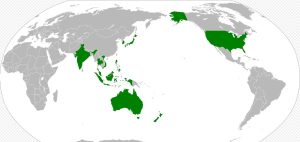
In 2021, the European Union agreed its “Strategy for cooperation in the Indo-Pacific”, with the intention to “contribute to the region’s stability, security, prosperity and sustainable development, in line with the principles of democracy, rule of law, human rights and international law.”
Also for the United States, the region’s geopolitical weight is on the rise, Last year, U.S. President Joe Biden launched the “Indo-Pacific Economic Framework”, an attempt to foster closer economic cooperation between the countries in the region, obviously with an increasingly assertive China in mind, apart from the massive economic growth potential.

Notably, the initiative lacked a number of countries, as for example Myanmar, which is close to China, but also Bangladesh, even if U.S. officials have been keeping the country in the loop, as it may still join.
Bangladesh, an “overlooked economic success story”
Together with the growing importance of South East Asia for the West, Bangladesh in particular has become more important. The country, which has a massive clothing industry, is expected to overtake China as the leading garment exporter to the European Union – also a result of the “decoupling” process following the war in Ukraine.
As a country, Bangladesh gets relatively little attention, despite the fact that it is one of the world’s most populous nations, counting with 169 million people more inhabitants than for example Russia.
Agathe Demarais, the Global forecasting director of the Economist Intelligence Unit, counters the image of Bangladesh as suffering from desperate poverty, noting that “Bangladesh is a sometimes overlooked economic success story. The Country’s GDP per person, at around US$2,500, is higher than India’s.”
She adds that “Bangladesh should count among [the] world’s 20 largest economies by 2050”.
🇧🇩 – Bangladesh is a sometimes overlooked economic success story
• Country's GDP per person, at around US$2,500, is higher than India’s
• Bangladesh should count among world's 20 largest economies by 2050 pic.twitter.com/KDO5s7Ag7f— Agathe Demarais (@AgatheDemarais) March 8, 2023
Upcoming elections
Last week, Josep Borrell, the EU High Representative for Foreign Affairs, discussed bilateral links between the EU and Bangladesh with the Minister for Foreign Affairs of Bangladesh, Shahriar Alam, on the occasion of a G20 summit in India. There is a lot to discuss. In 10 months time, a general election is coming up in the country, and pronouncements made by the European Union are being cited in the political debate. The General Secretary for the governing “Awami League” for example mentioned that the European Union “want all parties including BNP to join the next polls,” repeating the pledge by the Awami League’s leader, Prime Minister Sheikh Hasina, that “the next elections will be credible, free and fair.”
The ”BNP” refers to the “Bangladesh Nationalist party”, which is the main opposition party. It is a lot more averse towards cooperation agreements with neighbouring India than the ruling party. The fact they are being explicitly mentioned is to address Western concerns that the elections may not be free or fair and that there is a risk of election-related violence in particular.
According to the governing party, the BNP is “planning to oust the government by carrying out arson attacks, terrorism and militancy again like that of 2014-15.” Wide-spread protests, instigated by the BNP, are seen by the ruling party as attempts by the BNP to “destabilise the country in the name of movement and it is plotting to capture the state power by creating chaos.” The Bangladesh Nationalist Party (BNP) was founded by the country’s first military ruler. In 2001, it allied itself with the violent and extremist Jamaat-e-Islami, which was effectively banned by the Bangladesh Supreme Court in 2013. In 2014, BNP members reportedly instigated violent and destructive nationwide strikes thereby setting fire to thousands of homes, cars, buildings, and businesses, while fire-bombing polling booths on election day, all leading to 231 deaths and 1,180 wounded.
Discussed with @MdShahriarAlam of #Bangladesh today’s global crises: climate change and vulnerabilities of the LDCs, as well as the #Rohingya refugees hosted by Bangladesh.
This crisis is not forgotten. EU remains one of the largest humanitarian donors, with €287M since 2017. pic.twitter.com/hIUdZ3osVe— Josep Borrell Fontelles (@JosepBorrellF) March 3, 2023
Bangladesh: pivotal for the region
Political instability in Bangladesh, which has been rated “Partly Free” by Freedom House, is nothing to desire. Lots of Rohingya refugees from Myanmar have been welcomed by the country. The southeastern Bangladeshi city of Cox’s Bazar has even been hosting around 1 million of them since 2017. This has already caused domestic tensions.
In geopolitical terms, Bangladesh is an attractive partner for India, China and the West. In 2015, it signed up to China’s “Belt and Road Initiative (BRI)”, often seen as a mechanism to lure countries into a “debt trap”, but since then, Bangladesh has scrapped several key BRI projects and is now reassessing its involvement. Bangladesh did for example not allow Chinese investment in deep-sea ports suitable for a future Chinese Navy presence.
According to the analysis by the Financial Times, “Covid-19 and the spike in the price of imported energy since the war in Ukraine have threatened to reverse” some of the economic gains made by Bangladesh, leading to “a darkening political atmosphere.”
Next year’s elections may well cause instability that ends up driving the country away from the West, closer to China and on a collision course with India, which can count Bangladesh as its largest trading partner in South Asia.
Also because of this, the United States, the UK and Japan are among a group of “like-minded” democratic countries that have been meeting informally to discuss politics and governance in Bangladesh, with an eye to “positively engage” – in the words of one diplomat – ahead of the next election. Perhaps European foreign policy actors should join this initiative.












